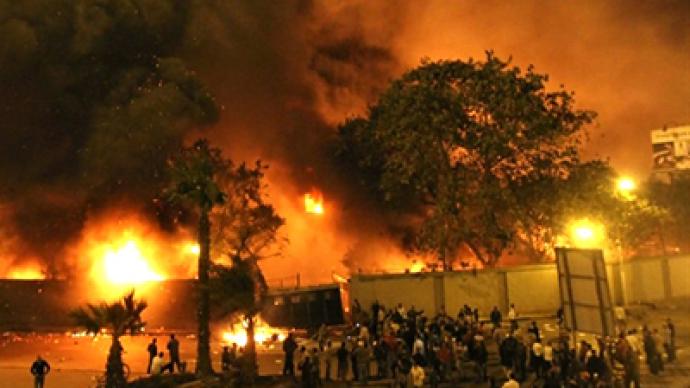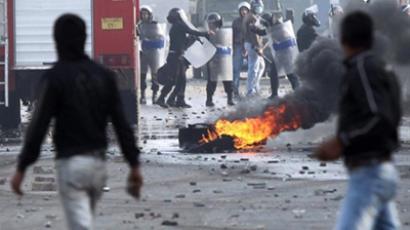Egypt torn in clashes for 6th day in a row, over 100 killed

More than a hundred protesters have been killed in Egypt since Tuesday in what is the biggest challenge to President Hosni Mubarak's three decade rule.
Early Sunday morning 10 people were killed while trying to break into the interior ministry – this brings the total number of dead to some 110, although the official death toll is much lower. Many Egyptians who have taken to the streets have reported being beaten by police following their arrests. Mobile clinics throughout capital Cairo continue to operate. Despite the imposed curfew on January 29, thousands took out in the streets in defiance of authorities.Meanwhile, the Egyptian military moved into the resort town of Sharm el-Sheikh on Sunday. Foreign nationals have been urged to leave the turbulent area as soon as possible.At the same time thousands of prisoners have broken out of jails around the country. Among them are Muslim extremists and militants. Some of them have reportedly made their way back to Palestine. Egypt country has shut its border with Gaza amid the uprising against the government.The famed Cairo museum was looted, with mummies ransacked. People in various neighborhoods also say their homes were broken into and goods stolen. Gunshots were heard on the Cairo University Bridge as protesters clashed with the army there.Protesters say they are going nowhere until Hosni Mubarak himself steps down. The opposition forces in the country have chosen the ex-head of the International Atomic Energy Agency and a Nobel Peace Prize laureate Mohamed ElBaradei to negotiate with tthe President. That is according to the Muslim Brotherhood – Egypt’s largest opposition group. The new opposition leader addressed the protesters on Sunday evening, urging President Mubarak to step down to allow a new phase in the country’s development to begin.Meanwhile, Egyptian President Hosni Mubarak has tried to address the protesters’ demands by appointing the country’s first vice-president – the intelligence chief and confidante Omar Suleiman. The new prime minister, Ahmed Shafik, has been tasked with forming a new government. However, protesters still insist President Mubarak should step down.The international community, particularly European countries and Unites States, have called on Mubarak to implement reforms and to refrain from violence. British Foreign Secretary William Hague has called for Hosni Mubarak to listen "urgently" to his people.In a statement made on Saturday, Hague expressed deep concern about the level of violence in the country. “We called on the government to exercise restraint and on the Egyptian people to pursue their legitimate grievances peacefully,” he said. On Friday, British PM David Cameron said that Egypt needed reforms.There have been protests and demonstrations around the world particularly with Egyptians showing support for their families and friends back home. Thousands of people gathered outside the Egyptian embassy in London following uprisings in Cairo on January 29. Supporters of the monitored hardliner Islamic group Hizb-ut-Tahrir were calling on the Egyptian leader to step down. Peaceful protests, with doctors and students among the groups, have also been held near the Egyptian embassy in Mayfair to support the demonstrations in Cairo. According to diplomatic cables released by WikiLeaks the US government had been planning to topple the Egyptian President for the past three years. The files show Washington had secretly been backing leading figures behind the uprising.Analysts have pointed fingers at the US, accusing it of trying to change the politics of Egypt’s regime.
“It’s obvious that the US and the UK are behind the recent events in Africa,” said Nikolay Starikov, an author and publisher. “We all know that a major transport oil artery is running through Egypt. The US only benefits from high oil prices, as all global gas and oil trade is carried out in dollars. Thus, the dollar demand is only growing. I don’t believe in spontaneous revolutions – when hundreds of thousands, millions of people come out onto the streets at the same time, taking into account there’s been no serious or immediate change to their standards of living.”
Ken O'Keefe, an activist based in Gaza, said the uprising in Egypt is no surprise, taking into consideration the situation in the country.“Wherever you oppress people, wherever you deny them basic human rights, wherever the inequity in the distribution of wealth is as perverse as it is in North Africa, the people will eventually rise up and it’s promising to see that people have started the process of shedding off the brutal and corrupt dictate of Mubarak,” he said.As for the diplomatic cables disclosed by WikiLeaks, O’Keefe said he wouldn’t doubt that the US had been involved, but the blame should still be laid on the Egyptian leadership. He also added that he is not going to give credence to all WikiLeaks cables.“WikiLeaks has perpetuated all sorts of illusions, including the illusion that Iran is the threat. Iran is not the threat. Israel is the threat, American imperialism is the threat, British complicity and support for those institutions is the threat, not Iran, and WikiLeaks has been instrumental in perpetuating that threat,” O’Keefe said. “Also, the so-called leader of WikiLeaks, Julian Assange, has marginalized and attempted to ridicule those of us who can see the truth of 9/11. So, I am not going to buy everything that WikiLeaks produces.”
Unrest in Egypt comes weeks after a month of chaos in Tunisia, which saw 80 deaths and the president being toppled before fleeing into exile. But observers insist it is still too soon to say whether the Tunisia’s experience will be replicated in Egypt.














